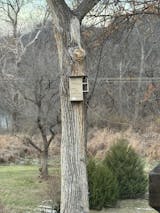The Enigmatic Mockingbird

"Listen to the mocking bird, listen to the mocking bird..."
With a captivating melody that echoes through diverse landscapes, this bird species native to North America stands out for its exceptional vocal prowess and adaptability. Renowned for its mimicry skills, imitating the sounds of other birds and even mechanical noises, this avian creature showcases a unique blend of intelligence and creativity. Sporting distinctive white patches on its wings and tail against a backdrop of gray plumage, this bird effortlessly blends into urban and suburban environments. Thriving in various habitats, from forests to city parks, it plays a crucial role in its ecosystem by regulating insect populations and aiding in seed dispersal. Join us on a journey to unravel the mysteries behind this fascinating creature's enchanting songs and behaviors, as we delve into the world of a remarkable avian species that continues to captivate and inspire.

The Northern Mockingbird
The Northern Mockingbird, scientifically known as Mimus polyglottos, is a captivating bird species indigenous to North America. Renowned for its exceptional mimicking ability, this bird possesses a talent that distinguishes it from other avian species. The Northern Mockingbird's mimicry prowess extends to imitating a wide array of sounds, including those of other birds, animals, and even mechanical noises. Their repertoire often includes intricate renditions of car alarms, sirens, and human-made sounds, showcasing the bird's remarkable vocal abilities. This mimicry serves various purposes, such as attracting mates and deterring potential threats. Moreover, the Northern Mockingbird's mimicry skills have been observed to evolve over time, with individual birds developing unique repertoires. This adaptability in vocal mimicry contributes to the bird's social interactions and survival strategies.
Feeding Habits
In addition to its mimicking prowess, the Northern Mockingbird exhibits fascinating feeding habits that further highlight its unique characteristics. These birds have a diverse diet that encompasses insects, fruits, and berries. Their foraging behavior involves searching for insects on the ground and consuming fruits from trees and bushes. The Northern Mockingbird's ability to exploit various food sources reflects its adaptability and resourcefulness in different environments. Furthermore, these birds play a crucial role in seed dispersal through their consumption of fruits, contributing to the ecosystem's biodiversity. The Northern Mockingbird's foraging behavior also influences plant populations by aiding in pollination and seed distribution.
Territorial Behavior
The Northern Mockingbird is known for its territorial behavior, vigorously defending its nesting sites from intruders. During the breeding season, male mockingbirds engage in elaborate singing displays to establish and defend their territories. These melodious performances not only serve as a means of communication but also as a warning to other males to stay away. The Northern Mockingbird's territorial nature plays a crucial role in ensuring breeding success and protecting its offspring. Additionally, these birds are highly adaptable to urban environments, often seen nesting in parks, gardens, and residential areas. Their ability to thrive in human-altered landscapes showcases their resilience and flexibility in habitat selection. The Northern Mockingbird's adaptability to urban settings has enabled it to coexist with human populations, adding to the charm of city life with its enchanting songs and vibrant presence.
Conclusion
The Northern Mockingbird's unique characteristics, from its exceptional mimicking ability and diverse feeding habits to its territorial behavior and adaptability to urban environments, make it a truly remarkable and iconic bird species in North America.

Interaction with Humans
Mockingbirds are known for their unique ability to mimic the sounds of other birds and even mechanical noises. Attracting these fascinating creatures to your yard can be a rewarding experience. By providing a welcoming environment with bird feeders, water sources, and suitable nesting spots, you can invite mockingbirds to make your yard their home. Once they start frequenting your yard, you can enjoy observing their behavior and listening to their diverse repertoire of songs. Mockingbirds are highly interactive birds and may even respond to human whistles or tunes, making for a delightful experience for bird enthusiasts of all ages.
To further enhance your interaction with mockingbirds, consider planting shrubs and trees that produce berries or fruits that these birds enjoy. Mockingbirds have a varied diet that includes insects, berries, and fruits. By incorporating plants like holly, dogwood, or elderberry in your yard, you can provide a natural food source that will attract mockingbirds and keep them coming back. Additionally, creating a birdbath or a shallow water feature can be a great way to entice mockingbirds, as they are attracted to water for drinking and bathing.
Another way to engage with mockingbirds is by spending time in your yard during their active hours. Mockingbirds are diurnal creatures, meaning they are most active during the day. By being present in your yard, you can observe their behaviors up close, such as their impressive aerial displays and territorial interactions with other birds. You may even witness their courtship rituals, which involve elaborate singing and displays to attract mates.
Furthermore, if you have a knack for music, try whistling or playing simple tunes in the presence of mockingbirds. These birds are known to mimic various sounds, and they may incorporate your tunes into their songs. It can be a fun and interactive way to bond with these intelligent creatures and appreciate their vocal abilities.
Fostering a positive environment for mockingbirds in your yard can lead to enriching interactions with these charismatic birds. By providing food, water, shelter, and your attentive presence, you can create a welcoming space that encourages mockingbirds to grace you with their presence and entertain you with their melodious songs and captivating behaviors.

The Northern Mockingbird is a fascinating bird known for its remarkable ability to mimic sounds and songs. By attracting these beautiful creatures to your yard, you can enjoy their melodious tunes and lively presence. To enhance your birdwatching experience and ensure that your feathered friends are well-fed, consider investing in a quality bird feeder. These feeders, available in a variety of styles and colors from brands like JCS Wildlife and Brome, are designed to last for years and integrate well into any outdoor landscape environment.
For a wide selection of bird feeders with innovative features and customer reviews, visit JCS Wildlife. With their commitment to quality, free shipping, and eco-friendly practices, you can create a bird-friendly environment in your backyard while supporting sustainable initiatives.



